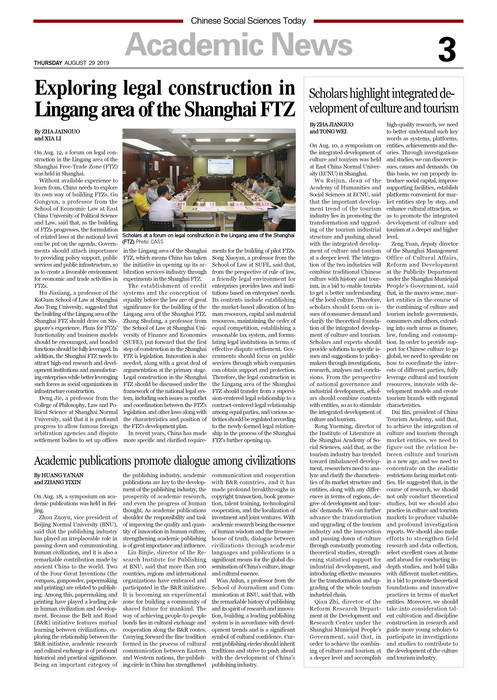Exploring legal construction in Lingang area of the Shanghai FTZ
2019-08-29 09:37:16
Scholars at a forum on legal construction in the Lingang area of the Shanghai (FTZ) Photo: CASS
By ZHA JAINGUO
and XIA LI
On Aug. 12, a forum on legal construction in the Lingang area of the Shanghai Free-Trade Zone (FTZ) was held in Shanghai.
Without available experience to learn from, China needs to explore its own way of building FTZs. Gu Gongyun, a professor from the School of Economic Law at East China University of Political Science and Law, said that, as the building of FTZs progresses, the formulation of related laws at the national level can be put on the agenda. Governments should attach importance to providing policy support, public services and public infrastructure, so as to create a favorable environment for economic and trade activities in FTZs.
Hu Jiaxiang, a professor of the KoGuan School of Law at Shanghai Jiao Tong University, suggested that the building of the Lingang area of the Shanghai FTZ should draw on Singapore’s experience. Plans for FTZs’ functionality and business models should be encouraged, and bonded functions should be fully leveraged. In addition, the Shanghai FTZ needs to attract high-end research and development institutions and manufacturing enterprises while better leveraging such forces as social organizations in infrastructure construction.
Deng Jie, a professor from the College of Philosophy, Law and Political Science at Shanghai Normal University, said that it is profound progress to allow famous foreign arbitration agencies and dispute settlement bodies to set up offices in the Lingang area of the Shanghai FTZ, which means China has taken the initiative in opening up its arbitration services industry through experiments in the Shanghai FTZ.
The establishment of credit systems and the conception of equality before the law are of great significance for the building of the Lingang area of the Shanghai FTZ. Zhang Shufang, a professor from the School of Law at Shanghai University of Finance and Economics (SUFE), put forward that the first step of construction in the Shanghai FTZ is legislation. Innovation is also needed, along with a great deal of argumentation at the primary stage. Legal construction in the Shanghai FTZ should be discussed under the framework of the national legal system, including such issues as conflict and coordination between the FTZ’s legislation and other laws along with the characteristics and position of the FTZ’s development plan.
In recent years, China has made more specific and clarified requirements for the building of pilot FTZs. Song Xiaoyan, a professor from the School of Law at SUFE, said that, from the perspective of rule of law, a friendly legal environment for enterprises provides laws and institutions based on enterprises’ needs. Its contents include establishing the market-based allocation of human resources, capital and material resources, maintaining the order of equal competition, establishing a reasonable tax system, and formulating legal institutions in terms of effective dispute settlement. Governments should focus on public services through which companies can obtain support and protection. Therefore, the legal construction in the Lingang area of the Shanghai FTZ should transfer from a supervision-centered legal relationship to a contract-centered legal relationship among equal parties, and various activities should be regulated according to the newly-formed legal relationship in the process of the Shanghai FTZ’s further opening up.



